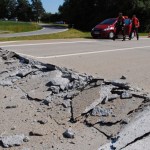satellites
The US National Weather Service does a pretty good job at predicting weather, but there are problems. In fact, we are behind compared to other nations, and parts of our infrastructure is deteriorating. Paul Douglas has been telling people for some time that we need to pay attention to our aging satellite system, and here Kate Sheppard talks about the slow but steady development of legislation to advance our storm prediction abilities:
Two related things came across my desk this morning that should concern anyone who sees climate change as an important issue.
In Germany, the roads are buckling and breaking because of excessive heat, and there seems to be inadequate funding to re-engineer them. Here's a photograph from Spiegel Online of what happens when the rubber meets the road (where the rubber is global warming):
"Crack on the A93 at Abensberg: Here the pad burst through the intense heat, a motorcyclist built so a fatal accident." (google translated)
Meanwhile, over at The Guardian, John Abraham has a post describing…
Oh boy, get out the tinfoil. Here's one the conspiracy nuts will howl over.
The temperature record that has been showing the lowest anomaly in the recent decades, HadCRU, the dataset managed by the UK's Met Office and the University of East Anglia's Climate Research Unit (CRU), is about to be revised upwards.
Met Office scientists have reviewed the whole sea surface temperature data set between 1850 and 2006 to take account of this bias. A paper has been submitted to the Journal of Geophysical Research which looks in more detail at all the biases in sea-surface temperature measurements from…
By Dr. Paul EstradaPlanetary physicist at the Carl Sagan Center for the Study of Life in the Universe, SETI Institute, and Gail Jacobs
If planets are a dime a dozen, moons are less than a penny each. There are at least 139 moons just within our own solar system. Most of these are the property of the gas giant planets beyond Mars. More than just a nice accompaniment to planets, moons may have habitats in which liquid water could ebb and flow - and possibly be a suitable home for life. Planetary physicist Dr. Paul Estrada investigates how moons around gas giants are formed -- an important…
This is just one of dozens of responses to common climate change denial arguments, which can all be found at How to Talk to a Climate Sceptic.
Objection:
Satellite readings, which are much more accurate, show that the earth is in fact cooling.
Some very old news here, that's all. I wonder how long before this one stops being brought up?
Answer:
There are a few advantages to the satellite readings, mainly the more uniform global coverage and the fact that readings can be taken at different altitudes. However, it is in fact a very complicated process which uses microwaves emitted by…


